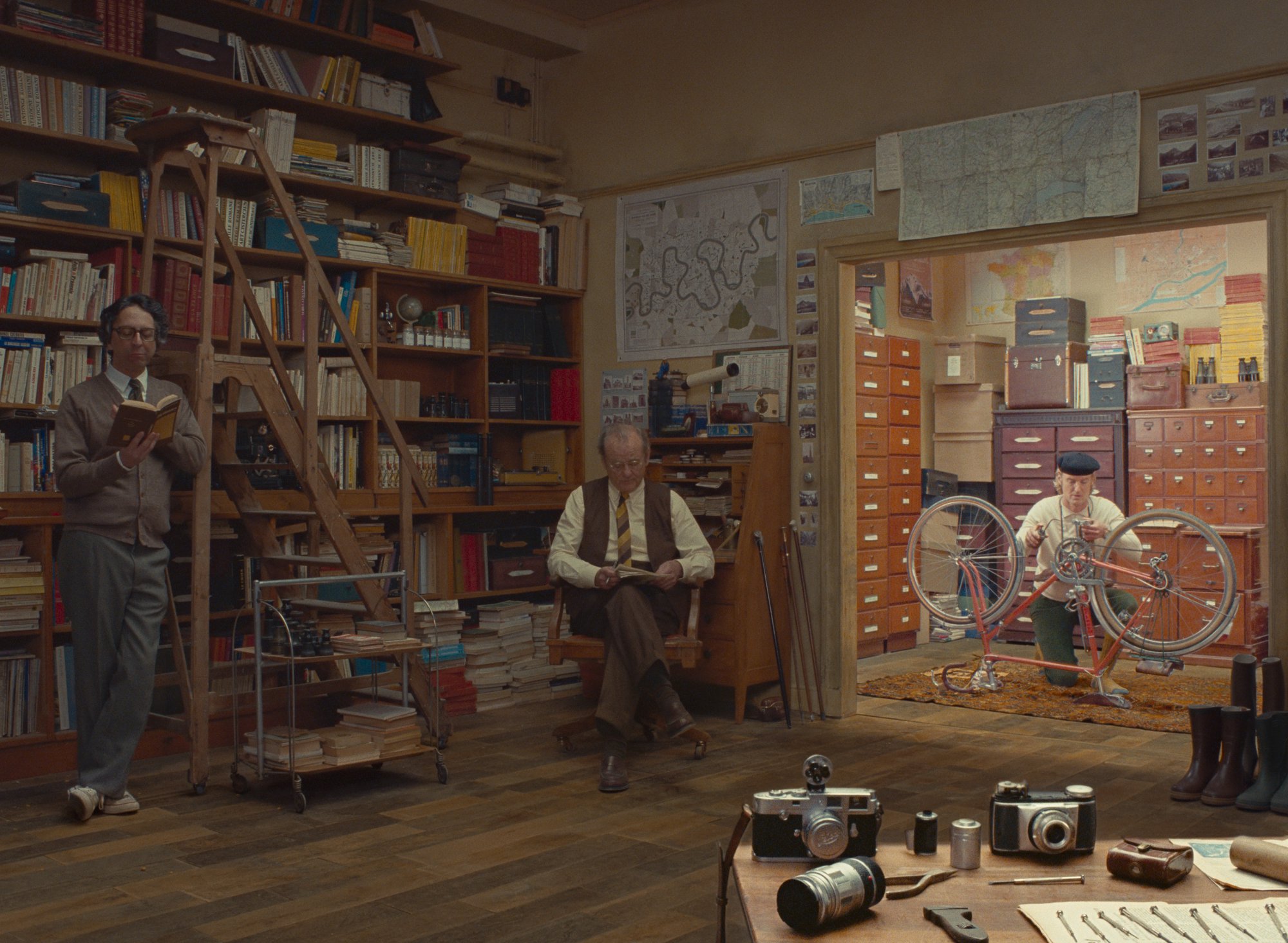I’ve been imagining The French Dispatch arriving in a COVID-free timeline, where it would have opened, as Wes Anderson films regularly did, at the Uptown Theater, and some art students or aging Kenwood couples near me would have chuckled a little too knowingly, and I’d have rolled my eyes (at least, you know, on the inside) at the people and the setting and (to some extent) the movie, and we’d all have gone home after completing our cozily familiar ritual with a sense of reassured comfort.
But the Uptown’s shut down, and the screen where I saw some truly great movies alongside genteel Oscar bait “marked by strong performances” and cheap quirk passed off as art is now blank. The age of midlist auteurs like Anderson who gentrified American art film with such colorful panache is gone; the corporations who always replace the advance wave of hipsters have moved in. Searchlight, procurer of speciality films, is now a Disney property, and we’ll see what that means for distribution and promotion. It’s a moment of widespread cultural loss that’s theoretically ideal for a nostalgic ironist like Anderson, but his melanchol-twee reveries yearn for a more distant past.
The French Dispatch is Anderson’s tribute to the New Yorker, via a fictionalized analogue situated in Ennui-sur-Blasé, France, and it’s structured like the magazine’s final issue after the death of its grand old man, founder and editor Arthur Howitzer Jr., who, as you’ve already assumed, is played by Bill Murray. There’s an introductory obit, a “Talk of the Town” style jaunt through the streets with Owen Wilson as a flaneur cyclist obsessed with Ennui’s gritty underside, and three different feature stories leading to an epilogue.
If founding editor Harold Ross famously declared the New Yorker was not intended “for the old lady in Dubuque,” a big part of its legacy is how readily the Dubuques and (yes) Minneapolises took to the vision of urbanity it exported. Anderson’s New Yorker facsimile cuts out the middleman—though it’s notably circulated in Liberty, Kansas, and Howitzer reigns benignly with that sort of middle-American common sense Murray is typically entrusted to represent in Anderson movies. The language (and there’s beaucoup of it, even for Wes) may be faux belletristic, the mannered slapstick may be très français, but there’s a hard American heart to it, the cold eye of a copy editor trimming away European excess. There’s a reason Howitzer doesn’t allow crying in the office.
The first “feature” centers on Benicio Del Toro as an imprisoned murderer/artistic genius whose muse (an impassive Léa Seydoux) is also his prison guard; his life changes after sharpie art promoter Adrien Brody discovers him. Narrated by Tilda Swinton in an incredible monologue that’s both a parody and celebration of a certain era of art critic, the tale ends with the little old lady in Dubuque getting her way: Without giving too much away, I’ll just say that modern art finds a home in Liberty, Kansas.
It’s in this segment that a stylistic trick used throughout the film—alternating between black-and-white and color mid-scene—is most effective, capturing each face with a cartoonist’s broad strokes: Del Toro’s weary and cragged, Seydoux’s smooth as polished stone, Brody’s sharp-edged and flinty. Maybe it’s Anderson’s way of his challenging his regular use of muted pastels (or of challenging critics who say he uses that color palette as a crutch) but whatever the formal impulse, the device subtly suggests a thematically appropriate flicker between memory and the present.
The less successful middle section sends Frances McDormand’s mom from Almost Famous to Ennui’s variant of Paris ’68 to scold university rabble rouser Timothée Chalamet (him again?), who’s all secondhand Gauloise smoke and bedhead. (Also to fuck him, a plot development that I would personally stay far away from were I a male screenwriter.) “The children are grumpy,” reads the graffiti on the Ennui walls; ah, the impetuous radicalism of the young is so beautiful but so foolish, blah blah fucking blah.
I hate to be all “at a time when...” about movies, which we all know are not real, but there are actual young people at actual barricades in American cities, and to infantilize the revolutionary political impulse is to endorse the kind of reactionary knowingness that gives irony a bad name. Politics aside, the story is Anderson at his laziest—an excuse to leech off the romance of hot young rads, let his characters slip into the same old clipped deadpan and rapid screwball rhythms, and plop an adorable scooter helmet on Lyna Khoudri’s adorable head. Bury this whole segment in the sand and cover it with paving stones.
But the third major segment finds the film’s emotional anchor in Jeffrey Wright. He’s brilliant, eloquent, Black, and gay, but he’s not quite James Baldwin because he’s silent on racial politics, he’s smooth where Baldwin was electric, and he’s a food critic. The story he tells is the usual gripping Anderson nonsense—kidnappers make off with a constable’s precocious son and can only be rescued by a Japanese chef, and a delightful (that inevitable Andersonian adjective) chase scene transforms into an actual cartoon. The drama comes through Wright’s retelling of that story during a framing device where Liev Schreiber, brilliant as a suave Dick Cavett-type, corners the cagey raconteur into discomfiting self-reflection.
In fact, the chief pleasure of this visual overload specialist’s latest is aural: hearing Swinton and Wright inhabit their not-quite-caricatures, capturing a specific inflection, tone, and rhythm as they tell bedtime stories for those of us who made it out of the 20th century alive. But there are also images and moments no other filmmaker will try for, that resonate outside the director’s tidy framework. Faces are captured to a cartoonist’s precision: each occasional glimpse of Henry Winkler as one of Brody’s gape-mouthed uncles will stick with me long after I’ve forgotten any plot details that I haven’t already. The archness, the stylization, the obsession with craft—all that is the means by which Anderson reaches these minor accomplishments. And if the rewards are too slight for you, well, come on, you should know that by now.
As a magazine The French Dispatch dies its own natural death, passing away all too neatly with its founder in 1975. Something about its clean demise makes Anderson’s glance backward feel less like an exercise in nostalgia than a survey through the wrong end of the telescope: The 20th century has never seemed so far away. The Dispatch’s writers confront the big stuff: gentrification, modern art, revolution, and the isolation of the marginalized outsider, with varying degrees of acuity and irony. But this tumult never changes the world around them. That world simply ends.
It’s not so simple in our non-movie reality. Publications take on new identities as new voices emerge or degenerate into brands exploiters by financiers. Great writers are exposed as monsters or frauds after their deaths, or live only to calcify into reprehensible cranks. The same old arguments about art and politics and sex are reargued in different configurations. The institutions that do vanish are victims of economic change. As the Dispatch crew types out their late leader’s obit at the film’s conclusion, Wright asks, “What comes next?” The fantasy Wes Anderson allows us is to never have to answer that question.
Special Screenings This Week
Thursday, Oct. 28
Diabolique (1955)
The Heights
An abusive man’s wife and his lover conspire together and kill the jerk. That’s when the trouble starts. $12. 7:30 p.m. More info here.
Halloween (1978)
Parkway Theater
Don’t be fooled by the title! Halloween is not until October 31! $9/$12. 8 p.m. More info here.
Ghostbusters (1984)
AMC Southdale 16
Small businessman heroically battle EPA overreach in this Reagan era classic. $5. 3:45 and 6:45 p.m. Friday; 1 and 6:30 p.m. Saturday and Sunday; 6:30 p.m. Monday through Wednesday. More info here.
Friday, Oct. 29
Planet Dune (2021)
Trylon
See the Sharknado brain trust’s take on not-Frank-Herbert’s apparently non-copyrightable sandworms, starring Sean Young, the Zendaya of the ’80s. $8. 5 p.m. Friday, Monday through Wednesday; 2:15 p.m. Saturday; 1 p.m. Sunday. More info here.
Hausu (1977)
Trylon
If you’ve never partaken in a Halloweekend screening of Nobuhiko Ôbayashi’s gory, giddy, sporadically coherent cult favorite, a long-established Trylon tradition, you should check in at least once. 7 and 9 p.m. Friday and Saturday; 3 and 5 p.m. Sunday. More info here.
Saturday, Oct. 30
Scream (1996)
Alamo Drafthouse
I am preemptively annoyed at the upcoming gritty reboot. $10. 6:30 p.m. More info here.
Hocus Pocus (1993)
Parkway Theater
Three executed witches return from the grave—and have no plans to go back there. $5-$10. 1 p.m. More info here.
Thirst (2021)
Trylon
A short film about homelessness in Los Angeles, followed by a Q&A with the director. $10 suggested donation. 5 p.m. More info here.
Sunday, Oct. 31
Halloween (1978)
Alamo Drafthouse
Can’t think of a better night to watch it. $10. 6:30 p.m. More info here.
Nosferatu the Vampyre (1979)
Trylon
Look, we could argue till the sun comes up about what the best film adaptation of the Dracula story is. But Herzog’s quite simply has the best rats. And the most rats. It’s frickin’ NosfeRATu. $8. 7 p.m Sunday; 7 p.m. and 9:15 p.m. Monday and Tuesday. More info here.
Monday, Nov. 1
Singin’ in the Rain (1952)
The Heights
Psst, let me tell you a secret about my Racket co-workers. They are inhuman monsters who hate all musicals. Not me though. Also Tuesday. $12. 7:30 p.m. More info here.
Wednesday, Nov. 3
Gojira (1954)
Alamo Drafthouse
That’s Godzilla to you, gaijin. $10. 6:30 p.m. More info here.
November Tape Freaks
Trylon
This month’s installment of the VHS-only series is a tribute to kung fu queen Cynthia Rothrock. $5. 7 p.m. More info here.
Portrait of Jason (1967)
Walker Art Center
Black gay hustler and raconteur Jason Holliday turns on the charm for Shirley Clarke camera, but leads the filmmaker and audience into darker places the longer he talks and the more he drinks. Through Friday. $12. 7 p.m. More info here.
Opening This Week
Antlers
There’s a wendigo on the loose! (Google it—I’m not your mom.)
Last Night in Soho
Edgar Wright’s psychological thriller about an aspiring fashion designer who time-travels to the ’60s and meets an aspiring singer, at which point, presumably, things get psychologically thrilling.
My Hero Academia: World Heroes' Mission
Too much going on in this title. I’m wary of it.
Ongoing in Local Theaters
The Addams Family 2
Becoming Cousteau
Dune (read our review here)
The Electrical Life of Louis Wain
Halloween Kills
The Last Duel
Mass
Ron’s Gone Wrong
No Time to Die (read our review here)
Shang-Chi and the Legend of the Ten Rings
Venom: Let There Be Carnage






